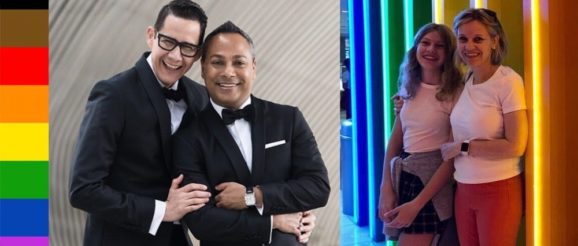Inclusivity in the Workplace: Pride Month 2020 | Legal Innovation Zone

Assistant Director of Ryerson’s Law Practice Program, André Bacchus, and his husband Antonio Pendones (left); Optimize Legal CEO Lesha Van Der Bij and her daughter (right)
Written by Omar Taleb
It’s hard to write a blog post celebrating Pride month right now; perhaps in later years, we can look back at 2020 as a year of continued, profound, and painful changes – growing pains. If there is one thing the first half of the new decade has taught the world, it is that society still has much to overcome.
At the Legal Innovation Zone, our commitment to the LGBTQ2+ community remains unwavering; this year, as the LIZ team sat to discuss Pride, the need for continuous improvement was the general consensus.
By now, the professional world is used to talking about “inclusivity” and “diversity”; these are buzzwords that portray a forward-thinking image. Reaching out to André Bacchus, Assistant Director of Ryerson’s , we asked about concrete steps that workplaces could take to practice inclusivity.
“Hiring is just the first step to diversity and inclusion. Truly becoming diverse and inclusive means engaging with, mentoring, and championing those who have been previously marginalized.” He continues, “That means ensuring you make the effort to build teams that include those who have been left out.”
Photo by fauxels from Pexels
Team-building, in particular, was emphasized as an effort that could be taken to integrate LGBTQ2+ employees into the work environment. André noted that “actively reaching out to champion and mentor those who have been ignored” helps ease LGBTQ2+ employees (particularly students, or recent graduates) into the workplace.
Practices such as mentorship can be beneficial to the overall team in promoting a workplace culture of mutual learning – a term used by HR specialists to describe a unique state of open communication between levels of employees that fosters creative problem-solving. Human Resources, in fact, can play a significant role in establishing an inclusive environment, with sensitivity training becoming a widely implemented practice to help properly address the concerns of specific equity-seeking groups in the workplace.
 LIZ member Lesha Van Der Bij, Chief Executive Officer and Founder of , has been active in the LGBTQ2+ community for over two decades, and helped organize Toronto’s first Dyke March in 1996. When asked about the hard choice LGBTQ2+ employees have to make, whether or not to be out at work, she noted that while she’s “always” been out in the workplace, everyone must “consider their circumstances.”
LIZ member Lesha Van Der Bij, Chief Executive Officer and Founder of , has been active in the LGBTQ2+ community for over two decades, and helped organize Toronto’s first Dyke March in 1996. When asked about the hard choice LGBTQ2+ employees have to make, whether or not to be out at work, she noted that while she’s “always” been out in the workplace, everyone must “consider their circumstances.”
Continuing, she said that the “simple act of discussing your partner and your life outside work does help promote awareness in the workplace”; touching upon this idea of normalizing non-heterosexual relationships, this signals to other employees that they are in a safe place to be open about their identity.
At the HR level, a conscious effort to normalize LGBTQ2+ people, their relationships, and proper pronoun usage for non-gender conforming employees, is vital.
Businesses of all kinds, from legacy firms to startup companies, have a responsibility to their employees – one that extends beyond branding themselves as inclusive and to actively engage with historically marginalized communities. Pride month celebrates LGBTQ2+ people, but it serves as a reminder of the work to be done. There remains a hesitation to invest in workplace practices that would foster the inclusivity businesses love to talk about; as we move forward in the new decade, firms would be wise to hold themselves accountable. We’ve come a long way from when these issues could have been swept under the rug.
There is still much to do.
